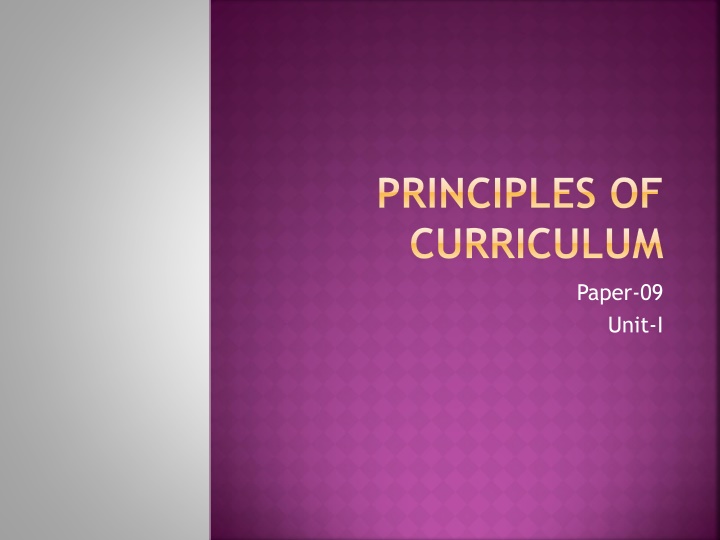
Principles of Curriculum Development
Explore the key principles of curriculum development, including child-centeredness, comprehensiveness, correlation, utility, forward-looking approach, and environmental-centeredness. Understand how these principles shape educational practices for effective learning outcomes.
Download Presentation

Please find below an Image/Link to download the presentation.
The content on the website is provided AS IS for your information and personal use only. It may not be sold, licensed, or shared on other websites without obtaining consent from the author. If you encounter any issues during the download, it is possible that the publisher has removed the file from their server.
You are allowed to download the files provided on this website for personal or commercial use, subject to the condition that they are used lawfully. All files are the property of their respective owners.
The content on the website is provided AS IS for your information and personal use only. It may not be sold, licensed, or shared on other websites without obtaining consent from the author.
E N D
Presentation Transcript
PRINCIPLES OF CURRICULUM Paper-09 Unit-I
Principle of child centeredness Principle of comprehensiveness Principle of correlation Principle of utility Principle of Forward looking Principle of environmental centeredness
PRINCIPLE OF CHILD CENTEREDNESS it means that curriculum should be in coherent with the age and grade of the child it should take account of the abilities, capacities, interest and mental development of a child and also the child's socio-economic background.
PRINCIPLE OF COMPREHENSIVENESS A good curriculum should enlist material aids, techniques, life situations, related activities to be done.
PRINCIPLE OF CORRELATION Everything in our surrounding in nature is correlated so, should be the subject study. Subjects should not be compartmentalized. They should be related to each other. For instance, maths, Science, English, Hindi and other subjects should be interrelated so that the child can have a holistic understanding of the concepts.
PRINCIPLE OF UTILITY Only those topics, subjects, concepts, and ideas should be included which are worth the utility of the pupil. They should not be taught alien concepts. Knowledge which matches the life of the child should be included.
PRINCIPLE OF FORWARD LOOKING This principle of Forward-looking means to include those topics in contents and learning experience that might prove helpful to the students in leading a fruitful life.
PRINCIPLE OF ENVIRONMENTAL CENTEREDNESS Curriculum should be developed keeping in view the physical, social and cultural environment of the students.
thank you
